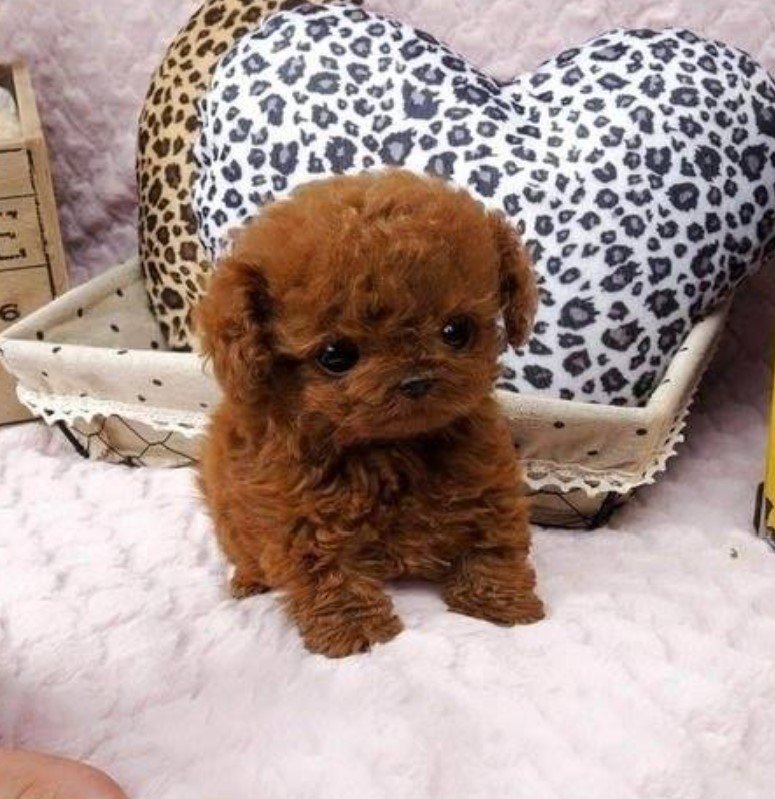Poodle Puppy Care: The First 30 Days at Home
Introduction
Congratulations — you’re welcoming a poodle puppy into your home!
Those first few weeks are full of love, excitement, and a little learning curve — and that’s completely normal. The first month is critical for setting routines, building trust, and ensuring your new furry family member grows happy and healthy.
Let’s walk through everything you need to know about nutrition, vet care, training, grooming, and safety during these first 30 days.
1. Nutrition & Feeding Schedule
Feeding your poodle correctly from the start is key to strong growth and good health.
What to Feed: Choose a high-quality puppy food designed for small breeds (for Toy and Miniature Poodles) or medium breeds (for Standards). Look for options with real meat, balanced protein, and added omega fatty acids for a shiny coat.
Feeding Frequency:
- 8–12 weeks old: 4 small meals per day
- 3–6 months old: 3 meals per day
- 6+ months: 2 meals per day
Hydration & Portions: Always keep fresh water available. Adjust portions based on your puppy’s weight and activity level — you can check the feeding guide on the food bag or consult your vet.
🐶 Recommended Brands: Royal Canin Puppy, Hill’s Science Diet Puppy, Purina Pro Plan Puppy, or Wellness Core Puppy.
When your poodle reaches around 12 months, slowly transition to adult food over 7–10 days to avoid tummy upset.
2. Health, Vet Visits & Vaccinations
Your puppy’s immune system is still developing, so timely vet visits are essential.
Typical Vaccination Schedule:
- 6–8 weeks: DHPP (Distemper, Hepatitis, Parainfluenza, Parvovirus)
- 10–12 weeks: Booster + optional Bordetella
- 14–16 weeks: Rabies + DHPP booster
Deworming: Every 2–3 weeks until 12 weeks old, then monthly until 6 months.
Vet Visits:
Schedule your first checkup within the first 5 days of bringing your puppy home. Ask about:
- Parasite prevention (ticks, fleas, heartworms)
- Vaccination record updates
- Ideal spay/neuter timing
- Microchipping for safety and identification
Keep all records organized in a small folder — this makes future vet visits smooth and stress-free.
3. Socialization & Early Training
Socialization is one of the most important parts of raising a well-adjusted poodle.
Social Exposure: Introduce your puppy gently to people, calm dogs, and everyday noises like the vacuum or doorbell. This helps build confidence and prevents fear-based behavior later on.
House & Crate Training:
- Take your puppy outside every 2–3 hours, especially after meals or naps.
- Reward success with a small treat or cheerful praise.
- Use a crate as a safe, cozy den — never as punishment.
Training Tips:
Keep sessions short (5–10 minutes). Use gentle positive reinforcement — treats, affection, or toys. Poodles are smart and eager to please, so consistency pays off fast!
4. Grooming, Coat & Bathing
Poodles are famous for their beautiful, non-shedding coats — but they need regular care.
Brushing & Coat Care: Brush your puppy’s coat every 2–3 days to prevent tangles. Start gently so they associate grooming with comfort and bonding time.
Bathing: Every 3–4 weeks or as needed. Use a puppy-safe, hypoallergenic shampoo (like Burt’s Bees Puppy or Earthbath). Always dry thoroughly to avoid chills.
Other Care:
- Nail trimming: Every 2 weeks
- Ear cleaning: Weekly with vet-approved ear wipes
- Dental care: Start brushing teeth early — daily if possible, with dog toothpaste
Regular grooming not only keeps your poodle pretty — it prevents skin irritation and infections too.
5. Safe Environment & Puppy-Proofing
Before your new friend explores freely, take time to make your home safe.
Remove Hazards:
- Loose wires and cords
- Small items that can be swallowed
- Toxic plants (like lilies, aloe, and philodendrons)
- Open trash bins
Play & Supervision:
Create a designated play zone with soft bedding, chew toys, and a crate. Gradually allow more freedom as your puppy learns boundaries.
Always supervise playtime — especially with children or other pets — until your poodle is confident and well-trained.
Conclusion & Reminder
Raising a poodle puppy is a joyful journey filled with cuddles, laughter, and a few learning moments. 💕
Remember — every day you spend bonding, teaching, and caring builds the foundation for a happy, confident, and well-behaved companion for years to come.
📋 Bonus: Download our free “First Month Puppy Checklist” to make sure you’re fully prepared!
🐾 Visit our Available Puppies Page or Contact Us for any questions — we’re always happy to help you every step of the way.

